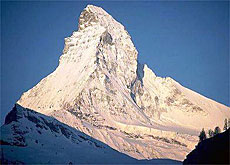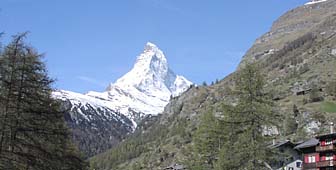Matterhorn climbers face safety test

Fed up with saving novice climbers on the Matterhorn, local guides have imposed a compulsory test on those hoping to scale the peak.
This weekend alone five people died on Swiss mountains – including the Matterhorn, which is a favourite with climbers.
Kurt Lauber, from the Zermatt mountain guide office, told swissinfo that the test was designed to ensure the safety of both clients and their guides.
“As mountain guides, we don’t know these clients. We see them for the first time on the Matterhorn and if they are not well prepared or have no rock climbing experience, it also becomes high risk for the guide,” says Lauber.
Summer months are peak season on the Matterhorn when up to 150 people per day attempt to scale its flanks during good weather.
Inexperience a danger
But the mountain’s popularity also causes headaches for local rescuers who annually save some 1,200 people from the area. Less lucky are the 15 or so people who die on the mountain every year.
The latest victim was a French guide who fell more than 1,000 metres while absailing down one of the cliff faces.
Many of the accidents stem from the mountaineering equivalent of traffic gridlock. Narrow passages up the Matterhorn’s various faces – sections of rock that can only accommodate one climber at a time – are often the scene of long delays.
The delays extend the amount of time climbers are exposed to the sport’s inherent dangers, such as rock fall, fatigue and human error.
However, the biggest frustration for professionals is the threat posed by inexperienced and unfit climbers.
Not only do they clog the climb’s critical sections, but they can also inadvertently trigger rock falls that endanger other climbers.
Rescue operations
And finally when they do encounter difficulties, it is often the guides who are called to carry out rescue operations, risking both themselves and their clients.
By screening Matterhorn aspirants on lesser climbs, guides also hope to lessen the number of aborted trips up the mountain.
“It makes no sense for clients that come up to climb the Matterhorn to have the mountain guide tell them halfway up that they are not good enough and must turn back. It’s not good for either party,” adds Lauber.
Although mountain guides have been testing potential clients on easier “training” climbs for decades, this summer is the first time it has become compulsory. “Everybody has to make this test,” he says.
Preparation is essential
The requirement is likely to upset clients who only allow one or two days to scale the mountain – something Lauber makes no apologies for.
“If you allow just two free days, that is too short for the Matterhorn. Matterhorn aspirants need a week during which they can make one or two climbs before they do the Matterhorn. The mountain is technically not very difficult, but it is quite long.”
Despite the greater emphasis on safety, the new compulsory test is unlikely to stem the flow of climbers who tackle the mountain without a guide.
Lauber estimates that around 60 percent of the people tackling the mountain do so without professional help.
And while most know what they are doing, there are always a few that are underprepared or downright inexperienced. “We cannot do a thing about them,” admits Lauber.
Cost of guides
Adding to the problem is the fact that hiring a professional mountain guide is often prohibitively expensive. The average cost of engaging a guide for the Matterhorn runs to around SFr1,000 ($666) per person.
Guides point out, however, that the fee is a pittance if it means a client comes off the Matterhorn safely.
As a result, Lauber does not believe the pre-Matterhorn test will see potential clients abandoning the services of paid guides.
“What I have seen until now is that clients have accepted [the changes] and are happy. It’s not a problem that we will have less clients.”
by Jacob Greber and Billi Bierling
The Matterhorn is 4,478 metres high.
Up to 150 people attempt the peak on good days.
Rescuers annually save over 1,200 people from the area.
Fatalities average around 15 people per year.
The guiding fee for the Matterhorn is around SFr1,000 per person.
Up to 1,200 climbers are rescued from the Matterhorn every year, often by mountain guides risking their lives.
Before any hopeful can tackle the 4,478-metre Matterhorn – widely considered one of mountaineering’s most attainable prizes – guides will force clients to undergo one or two training climbs.
To help reduce the toll, guides have introduced a compulsory pre-climb test to weed out unsuitable climbers.

In compliance with the JTI standards
More: SWI swissinfo.ch certified by the Journalism Trust Initiative

You can find an overview of ongoing debates with our journalists here. Please join us!
If you want to start a conversation about a topic raised in this article or want to report factual errors, email us at english@swissinfo.ch.